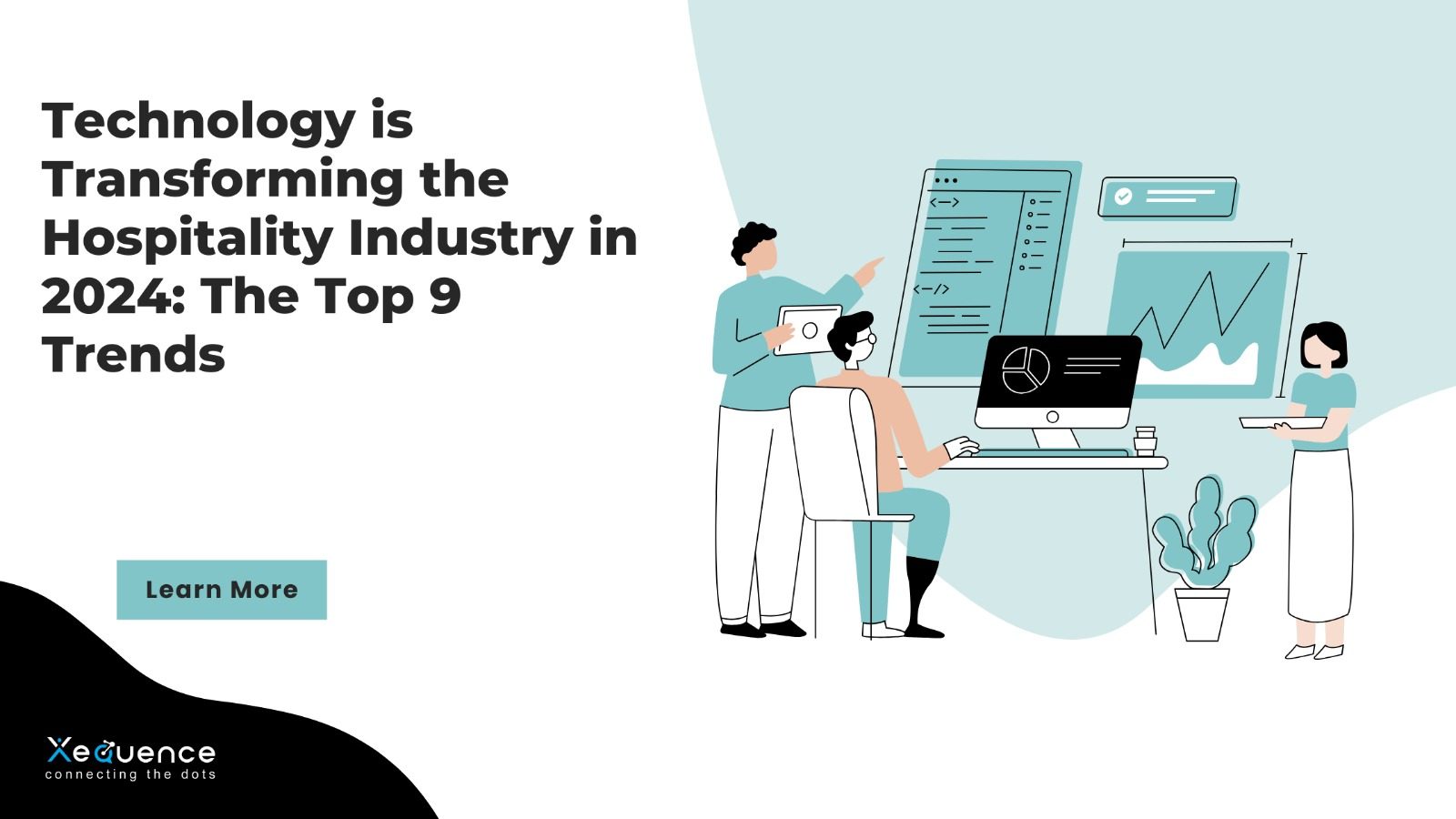- Home
- Hotel Management
- Technology is Transforming the Hospitality Industry in 2024: The Top 9 Trends
Technology is Transforming the Hospitality Industry in 2024: The Top 9 Trends
- July 5, 2024
- Suraj Kumar
- Hotel Management, Technology, Travel

Technology advancements are causing a significant upheaval in the hotel sector in 2024. Every element of visitor experiences, operational effectiveness, and business strategy are changing as a result of these developments. The field is changing quickly, with blockchain improving security and sustainability, AI-powered personalization and augmented reality for immersive guest experiences among other developments. Additional industry revolutions include the incorporation of IoT devices for smart rooms, robotics for optimizing service delivery, and big data analytics for decision-making. These developments promise to revolutionize hospitality providers’ methods of innovation and competitiveness in an increasingly digital world, while also improving client pleasure. A few key technological advancements that will influence the hotel industry in 2024 are examined in this piece.
Artificial Intelligence
Artificial intelligence is undoubtedly a trendy topic these days as it offers hospitality both benefits and problems. Although artificial intelligence has the potential to significantly improve operational efficiency and the guest experience, expert hoteliers understand that personal connection and first-rate service are fundamental to the hospitality industry.
By enabling them to do more with fewer workers, AI automation can help your team serve customers more efficiently. Furthermore, with AI-driven concierge services, guests may receive immediate attention and personalized insights that precisely match their preferences and demands.
Social media and review websites
Social media has changed the relation graph between guests and hotel management. Guests can share experiences and information about room rates and amenities, rate hotels, and post reviews. These reviews are crucial for travelers deciding where to stay, eat, visit, and how to get around. Reviews have also created a competitive market, raising travel standards. Hotels should work even harder to reach expectations and resolve service problems as it occur. In this regard, social media reviews have become a highly powerful tool.
Video Analytics
The hospitality sector has been demonstrating its affinity for video analytics more and more as it is adopting artificial intelligence travel innovations at an increasing rate. Video analytics has been extending into virtual booking, security, and even virtual travel experiences, touching on many aspects of the hospitality sector.
Robotics
Robots will never be able to fully replace people, especially given the importance of the human aspect to the hospitality sector. This is the definitive resolution to the issue. That being said, human-controlled robots will have a significant impact on the hospitality sector in the future by increasing operational efficiency and facilitating rapid guest interaction between personnel and visitors. Robots can take on the roles of cleaning, servers, or even guest greeters, empowering hoteliers to create a friendly work environment. They can also alleviate worker workloads and draw customers’ attention in a unique way.
Point of Sale (POS) System
It is challenging to manage the in-room restaurant, whether you are a new hotelier or experienced traveler. A POS system serves as a central hub, managing inventory, guest data, sales, and payments. Each order updates kitchen inventory, and mobile POS devices facilitate quick guest transactions. Ultimately, ensuring hospitality management system success means implementing digital transformation for a new business framework, enhanced customer experiences, and meeting industry demands.
Personalization Powered by Big Data
In order to turn the vast volumes of raw data, into useful insights for your company, it is now essential to leverage the power of data analytics. By transforming data into actionable insights, you can strategically manage your profit margins and room rates by analyzing rival pricing, market demand, and booking patterns in real time. When you approach marketing with a marketing lens, data assists you in creating highly focused campaigns that yield higher campaign ROI and more conversions.
When you prioritize data, your guests will also profit since, according to research, 57% of modern travelers will pick a hotel that gives tailored treatment based on their past purchases over one that does not.
Virtual and Augmented Reality
Properties can provide unique, engaging guest experiences, including destination discovery, by utilizing virtual reality and augmented reality. To enable guests to virtually tour facilities, check out rooms, and preview amenities, Hyatt Hotels, for instance, uses virtual reality. Due to its ability to remotely visualize and customize event locations, this application is very useful for event planning. By incorporating these technologies, hotels have the potential to provide a memorable experience for their visitors and pave the path for increased guest happiness.
Sustainable Offerings and Improvements
A major factor changing the hospitality tech scene is the increasing demand from tourists for eco-friendly lodging and sustainable hotel operations. Three out of four tourists said they want to travel sustainably this year, according to Booking.com research. Furthermore, according to an Expedia poll, 90% of tourists specifically search for eco-friendly hotel options.
Hotel managers are using technologies to lower their environmental impact without reducing visitor experience, from energy-efficient HVAC and lighting systems to hotel automation. Automation minimizes waste, lowers expenses, and streamlines processes. Incorporating sustainable hotel practices into operations will help establishments draw in more eco-aware visitors, foster customer loyalty, and spearhead the movement toward a more sustainable future.
Being Contactless
Contactless technology will still be reshaping the hospitality sector in 2024, even though it really took off with the epidemic. Travelers who can avoid direct interaction with staff and other guests are becoming more and more selective about hotels. Profitability and income can be increased by hotels that take advantage of this demand by providing self-service options like contactless check-in and checkout. In an effort to appease passengers who are in favour for contactless payment choices, hotels are now adopting digital wallets and mobile payment options. Digital tipping ensures gratuities can be easily given, which helps increase staff retention, while biometric recognition offers an additional degree of convenience and security.
Conclusion
In summary, a vast array of technologies and tools are employed by the hotel sector to boost productivity, optimize operations, and improve the visitor experience are all included in the quickly expanding and changing field of hospitality technology. A few of the major developments in this industry are the growing usage of mobile technologies, VR and AR, data analytics and reporting tools, AI restaurant software, and machine learning. However Hotels must find a balance between personalized offering to customer and the use of technology.
Recent Posts
5 Myths About AI in Hospitality Operations | Facts Every Hotelier Should Know
Newsletter
Get regular updates on data science, artificial intelligence, machine
You may also like

Al Flight Assistant Integration with Airline Reservation Systems

The Future of Hospitality Operations: AI Trends to Watch

AI Flight Assistants for Real-Time Flight Updates, Alerts




